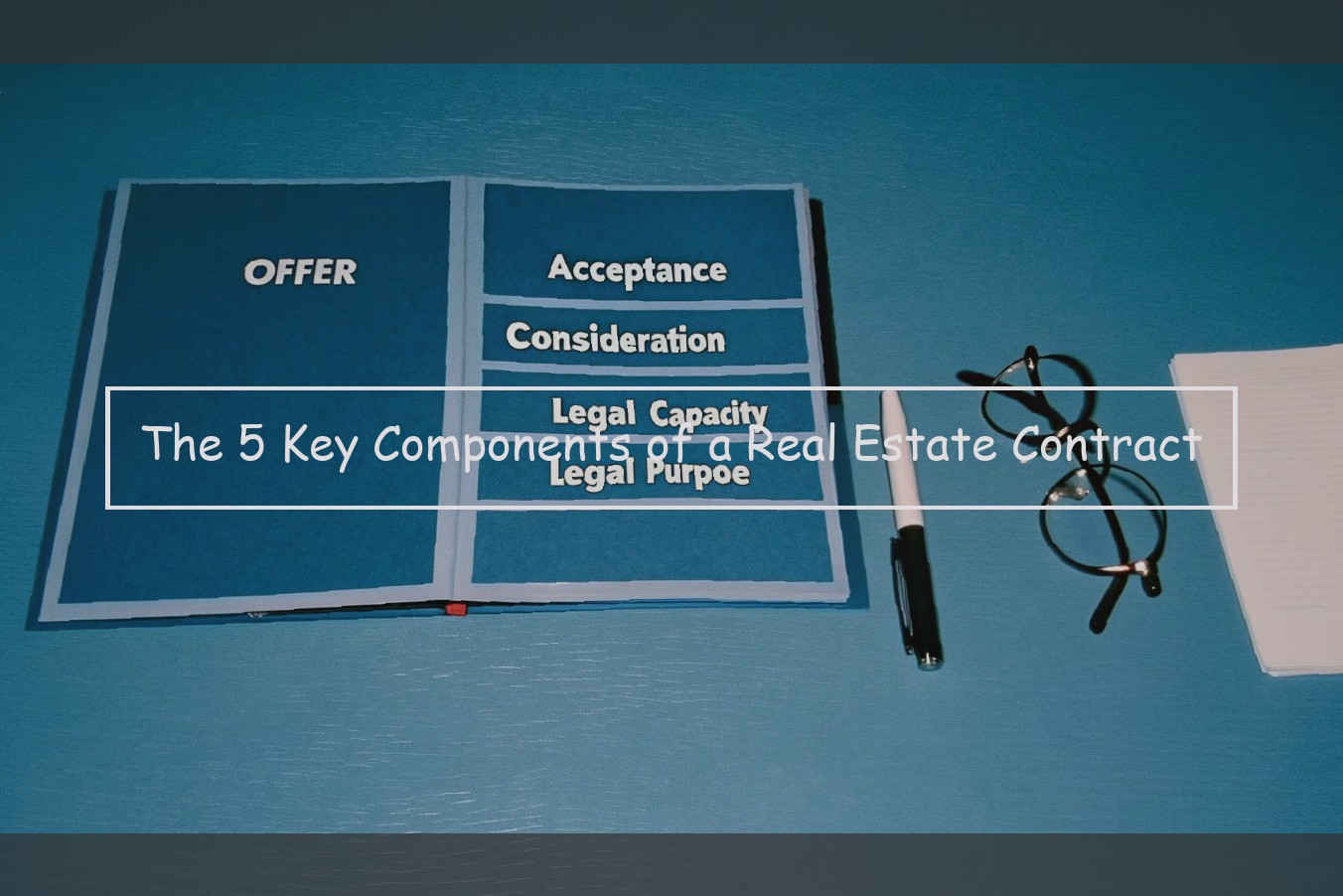An Introduction to Real Estate Contracts
A real estate contract is a legally binding agreement between two or more parties that establishes the terms of a real estate transaction, such as the purchase, sale, or lease of a property. The purpose of this contract is to define the obligations and rights of each party involved, and to detail what is expected for the exchange of money, services, or other consideration. A real estate contract is integral to establishing the responsibilities of all parties involved, for without it, there would be no legally defined transaction. In the world of real estate, where such high value is placed on contracts and agreements, it is in your best interest to understand exactly what it is that you are signing when agreeing to the conditions listed in a real estate contract . Not only does it detail the obligations to which both parties agree, however, but it will also contain material that, if breached, can lead to significant monetary damages. For this reason, it is not only important that you understand exactly what you are signing, but that you understand when consultation with a real estate attorney or a real estate agent is warranted. Since a real estate deal is likely one of the biggest that you will ever make, it is too big of a risk to not consult with an experienced attorney or agent. In addition to terms that both parties are expected to abide by, a real estate contract should also contain signatures from all parties involved.

Part 1: Offer
Just because someone is looking to buy a property, doesn’t mean that they have an offer to purchase that property. Instead, the "offer to purchase" is the act of buying the property. While it is common for a buyer to directly approach a seller about their decision to move forward with an offer to purchase their property, a buyer may also consult their real estate agent. The real estate agent will often submit the offer to purchase on behalf of the buyer when preparing the offer.
The offer to purchase is a legal document and contains the subjects and conditions that must be satisfied before a sale is complete and a real estate transaction occurs. For example, an offer to purchase may be conditional on the buyer securing financing for the property (the "mortgage condition"). An offer to purchase may also contain subjects, which are conditions that the buyer must be satisfied with, to be fulfilled within a specific period of time (the "subjects").
An offer to purchase is legally binding on the buyer once it is accepted by the seller. The purchase price, as well as all subjects and conditions that must be fulfilled are listed within the offer to purchase and must be adhered to.
If you are selling your property, it is in your best interest to have any potential buyers make their offer to purchase in writing. Verbal agreements are difficult to enforce in the Court system and cannot be proven easily. Further, verbal agreements remain open for misunderstanding, interpretation and/or renegotiation which places both the seller and the buyer at a disadvantage in terms of legal recourse.
When you decide to sell your property and have interest from multiple buyers, it is important to ensure that the offer to purchase is clear and that the buyer understands that their offer to purchase is legally binding before you agree to sell your property. To ensure that the terms of the sale are clear, have the buyer sign the offer to purchase and ensure that the offer to purchase is dated.
In order for an offer to purchase to be legally binding, it must be in writing, signed by both parties, contain the conditions that will be fulfilled and must be dated.
Part 2: Acceptance
Once an offer is prepared and delivered it can be accepted, countered or rejected. In order to form a contract the offer must be accepted by the offeree in the manner specified in the offer without conditions or counter-offer. If the offer states that it needs to be signed and delivered or emailed, any other form of acceptance, including a verbal acceptance, would not create a legally binding agreement.
Although a counter-offer is a rejection of the original offer, it constitutes a new offer made by the offeree who then becomes the offeror, and the original offeror becomes the offeree. In a very real sense, the original offeror must now accept the new offer to form a contract. If he or she does, a contract is formed. Counter-offers between real estate agents and sellers, buyers and sellers, or sellers and buyers should be presented to all parties to the offer in writing, even if the parties have reached an agreement concerning price and terms verbally.
Acceptance must be communicated to the offeror to be effective. Under normal circumstances, if the seller is represented by a salesperson or broker, the offer would be communicated to the seller through the agent. If the seller is not represented by an agent, notice of acceptance would go directly to the seller. Notice of acceptance to the offeror generally occurs at the time the seller signs the contract. However, the seller may authorize an agent to enter into a deal thereby communicating acceptance by authorizing the agent to sign with the intent of submitting the agreement. The offer would then be valid and enforceable as of the time the seller communicated his or her intention to accept the offer to the authorized agent.
Part 3: Consideration
Consideration refers to the actual thing of value that is exchanged between the parties to the contract. In the case of a real estate contract, the seller exchanges the property in exchange for money. Payment terms can vary. For example, an older couple might contract to sell their house, using the proceeds to buy an apartment closer to a daughter and her family. The consideration to the buyer, or the purchaser, is, of course, the house. The consideration to the sellers is equivalent cash to the sale price as well as relief from the hassle of the house, its upkeep and possibly even former expenses like property taxes and assessments. In the case of a lease, the consideration is the use of the property for a period of time in exchange for money over that period.
Consideration is an essential element of a real estate contract for it to be enforceable. If a real estate contract is not enforceable, it is worthless. Perhaps one of the most common types of real estate contracts is the purchase and sale agreement. A key part of any purchase and sale agreement would be all of the terms associated with the buyer’s payment for the property. This may be the deposit, the contingencies, the closing and any costs associated with the buyer’s obtaining financing for the property. These payment terms are always a critical aspect of the binding nature of the contract.
Part 4: Legal Capacity
The fourth element of a real estate contract is "legal capacity". When parties enter into a contract there are a number of ways that the contract can be invalidated. Generally speaking, if both parties have ‘legal capacity’ to enter into the contract than the courts will look for ways to enforce the contract. Conversely, if a party lacks legal capacity, the contract deals automatically with an unenforceable contract.
Who Has Legal Capacity to Contract? Individuals who are 18 years of age and of sound mind can enter into contracts and therefore are said to have legal capacity. It is also quite common to have a contract entered into on behalf of a minor (someone under the age of 18) by his or her parent or guardian. If a minor chooses to affirm the contract, then the doctrine of capacity will not prevent him from enforcing the contract .
In short, the doctrine of capacity will normally not prevent execution of a contract if:
• the minors age is more than 16;
• the contract is properly affirmed by the minor;
• the minor intends to gain some benefit from the contract;
• the contract is fair and reasonable; and,
• the minor has signed a separate document confirming the contract.
Where the minor has reached the "age of majority" (18 years) he or she will have legal capacity and cannot plead the doctrine of incapacity as a defence.
A person is deemed to have lost his legal capacity when he:
• Misapprehends the character or nature of the document which he is executing;
• Is not able to appreciate the significance of the transaction; or,
• Cannot exercise his free will and judgment in relation to the matter by reason of excitement, undue influence, insanity, intoxication and so on.
Part 5: Legal Purpose
Along with the elements of capacity, mutual consent, consideration and lawful object, a legally enforceable real estate contract must be for a legal purpose. The unlawful object doctrine requires that a contract must be for a legal purpose or it cannot be enforced in a court of law. The requirement of legal purpose is common sense if you stop and think about it for a minute. Any legally binding contract, by its very nature requires the legal exchange of something of value for something of value. Therefore, the contract itself has to have a legal object. It would be patently absurd for the law to require that a contract exists without a legal object, when the mere existence of a contract requires a lawful object. An example of an unlawful object would be an agreement to sell marijuana to someone. Such a contract would be void because the object of the agreement is illegal. It is important to note that courts will rarely get involved to deal with an unlawful object, except perhaps when the unlawful purpose is fraud on a governmental agency—even then, the likelihood of recovery on a quazi contract theory is questionable. But if the statute or case law makes it clear that the agreement is illegal, the contract is void. Another troublesome area involves contracts that are legal but are moral or societal issues that are not yet distinctly illegal. In those cases, the courts will, at present, only rule on the legality of the object because they do not want to make moral decisions for the society at large.
Conclusion and Practical Tips
Understanding the essential elements of a real estate contract is crucial for every party involved in a real estate transaction. By ensuring that your contract has the necessary components, you can protect your rights and lay the groundwork for a successful sale or purchase of real estate. It prevents the deal from being void or voidable due to critical pieces being overlooked.
It is, therefore, practical advice for parties to engage the services of a skilled real estate attorney when entering into a contract to make sure that all legal requirements are met . Parties should take time to read their contract carefully, ensuring that all elements are clearly defined and met. If there is any question about whether the contract has all of the necessary elements, you should meet with a competent real estate lawyer to discuss your concerns. A lawyer may be able to include language that helps to clear up any ambiguity in the contract to ensure that nothing is overlooked during the process.



